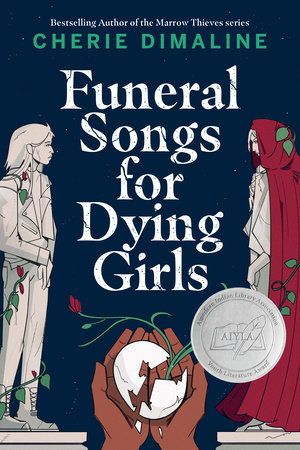Review by Tânia Cerqueira
Please note: I am a non-Indigenous reader who grew up in Portugal, a country known for its colonial exploitation and genocide.

Funeral Songs for Dying Girls by Cherie Dimaline (author of The Marrow Thieves [2017] and its sequel, Hunting by Stars [2021]) is a poignant and beautifully written story that explores the themes of loss (the loss of loved ones, friendships, and home), grief, and the struggle to belong.
The story centres on Winifred, a teenage girl who lives in a cemetery with her father, who works at the crematorium. Growing up with a father acting as a specter since her mother passed away giving birth to her, Winifred spends her days roaming the graveyard and finds solace in daydreaming about losing her virginity to her best friend and skip counting – whenever she feels anxious, Winifred starts counting patterns and numbers, an action that seems to indicate she has obsessive-compulsive disorder (OCD). When Winifred learns that the crematorium might have to close and her father will lose his job, she decides to do whatever she can to stay in the only home she has ever known, even if it means keeping up the pretense that the cemetery is haunted – rumors of sightings began when Winifred was mistaken for a wandering ghost by tourists. However, everything changes when she meets Phil, a real teenage Indigenous girl ghost.
Winifred isn’t a character without flaws (far from likeable at the story’s beginning). Nevertheless, the loneliness and grief she experiences and her struggle to belong make her a complex character whose growth through the novel is a joy to witness. Through her interactions with Phil, Winifred is forced to confront her grief, the complexities of love and belonging, and her own identity. As Métis from her mother’s side, Winifred sees her identity as split. She finds herself caught between two worlds, struggling to connect with her Indigenous heritage. Phil’s telling of her adolescence (which touches on the subject of missing and murdered Indigenous women and girls) helps Winifred to connect with her Indigenous identity as well as opens doors to first loves and broken hearts.
In Funeral Songs for Dying Girls, the author’s eerie, beautiful prose transports the reader into an enticing world of loss, where storytelling is represented as cathartic and central to the quest to find oneself. More importantly, Winifred’s journey teaches the importance of accepting grief instead of letting it fester and consume you.
Funeral Songs for Dying Girls
Written by Cherie Dimaline
2023, Penguin Random House
ISBN: 9780735265639
Reviews: Kirkus, Publishers Weekly, School Library Journal
Awards: nominee for the Bram Stoker Award for Best Young Adult Novel (2023) and the American Indian Youth Literature Award for Young Adult (2024).

Tânia Cerqueira (she/her) is a PhD candidate at the Faculty of Arts and Humanities of the University of Porto, Portugal (FCT – Foundation for Science and Technology, 2021.04547.BD). She collaborates at the Centre for English, Translation, and Anglo-Portuguese Studies (CETAPS) and is currently an Executive Board member of the Young Adult Studies Association (YASA). When she is not squeezing her cats with hugs, she can be found wandering in book worlds inhabited by creepy yet lovable monsters and rebellious heroines.
—

GLLI’s 2024 International YA Literature Month has been curated by Dr Emily Corbett. She is a lecturer in children’s and young adult literature at Goldsmiths, University of London, where she leads the MA Children’s Literature: Theoretical Approaches to Children’s and Young Adult Literature programme. Her research focuses on the growth and development of YA from literary, publishing, and cultural perspectives. She is also General Editor of The International Journal of Young Adult Literature and was founding Vice President of the YA Studies Association. Her monograph, In Transition: Young Adult Literature and Transgender Representation (2024), is forthcoming with the University Press of Mississippi in June. You can find her contact details on her institutional website and connect with her on Twitter and Instagram via @DrEmilyCorbett.
Opinions expressed in posts on this site are the individual author’s and are not indicative of the views of Global Literature in Libraries Initiative.
